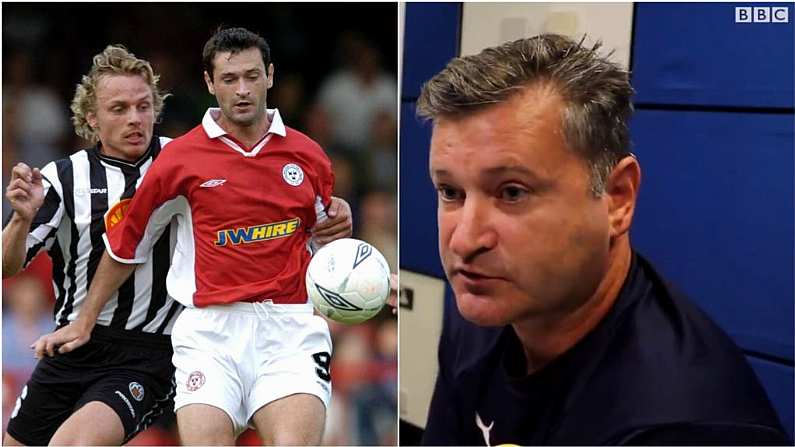A prodigy at Middlesbrough, a fixture of early Mick McCarthy Ireland teams, Alan Moore's career was all potential. Things didn't always go to plan due to injury and circumstances, but the Dubliner had a solid 13 year career in England before returning to Ireland and anchoring Shelbourne's famous run in the 2004 Champions League.
While this was the public profile of a gifted footballer, what was going on privately painted a much different picture. Opening up in a powerful interview with BBC Radio Lancashire, Moore described the long, arduous battle with depression he's been fighting ever since he was a teenager.
"I had suicidal thoughts when I was 18-19. It was only a few years ago when things escalated badly. There was no one-off trigger"
In a candid interview, former @BurnleyOfficial, @Boro & @FAIreland midfielder Alan @Moorsey293 talks about his struggles with #mentalhealth pic.twitter.com/0jz4PC2FUV— BBC Sport Lancashire (@BBCLancsSport) July 4, 2019
While things would get worse for Moore when he playing career ended, his mental health was an issue even in his earliest days in England.
I had, sort of, suicidal thoughts from 18, 19, when I was younger. Wanting to just drive the car into walls, straight into walls. And I always had a thing in my head where I said I won't last until I'm 23, for some reason. I had that age in my head, and I remember sitting and telling my mother, I won't live until I'm 23.
Unfortunately, in the '90s, without the education on mental health there is now, it's clear this cry for help wasn't fully recognised.
Obviously, 20-odd years ago, it was 'don't be stupid', you know, 'get on with it'. And this was probably at the height of when I was playing really well, and doing really well at Middlesbrough, but I always had that sort of thing in my head. And it wasn't an ongoing, every day thing, it used to come and go, but just drive straight into a wall and just kill yourself and that was the way I was going to go.
Moore managed to get through a 15 year career with these feelings coming and going. After he retired in 2008 after a spell with Sligo Rovers, he returned to England, doing his coaching badges and eventually ending up managing the Carlisle United academy. It was after his football career when the Dubliner's issues really came to a head.
But you get on with football, and it was only a few years ago where things sort of escalated really badly. A build up of stuff, there was no one-off occasion, no one-off trigger with me, it was just a build up where I got to the stage where everyday I was walking around thinking, 'I'm going to hang myself today' or 'I'm going to chuck myself in the river', 'I can put a rope around that banister'. I had rope in the boot of the car. Every dog walk became picking a place where you were going to go.
With 140 kids to look after at Carlisle, Moore claims even his closest friends were unaware of his problems, and he was able to put on a public face, doing a good job, never missing a day's work.
You manage to have two faces I think. One that you put on for work, for your friends, and then you've obviously got your own one then that goes on with the issues behind your two ears.
Moore's description of his normal day when at his worst makes for frightening reading and will be something that many sufferers with mental health with recognise.
A normal day? Listen, if I had the day off work, my normal day would be to stay in bed all day. If it was off-season, where I didn't have to go to work, I could stay in bed for four or five days, not eat, no drink, not come out of the room. And I've got three young kids, a wife and three young kids, and I could quite easily stay in there and not eat, not drink, no telly on, no music, phone switched off, just away in my own little world. What I tried to do at those times was try to sleep off the thoughts you had going through your head, and that was my coping mechanism at the time.
Opening up like this for Alan Moore isn't easy, as he admits himself, but it is essential to help others going through the same issues as he explained on Twitter.
Got to be honest hate watching myself talk really do but willing to put myself out there if it helps others https://t.co/L9r9P4Edj0
— Alan T Moore (@moorsey293) July 4, 2019
It's still there. I still have days like it. The structure of work and all the rest of it helps. Having daily goals and targets helps. And that's why I find the off season probably most difficult.
If you're experiencing similar thoughts or issues described here, please contact the Samaritans for free on 116 123












